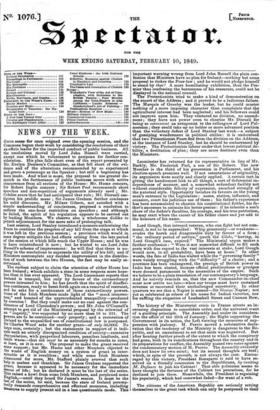The history of the Ministerial crisis in France attests an
in- creasing disposition to consolidate order, and the universal want of a guiding principle. The Assembly had under its considera- tion the affair of the 29th of January; the Right supporting the Government in its action, the Left viewing the measures of sup- pression with jealousy. M. Perree moved a substantive decla- ration that the tendency of the Ministry is dangerous to the Re- public, and an amendment to set that aside was negatived. But after hearing further proofs of the extent to which the conspiracy had gone, both in its ramifications throughout the country and in its preparations for conflict, the Assembly passed two votes against the condemnatory motion of M. Perree. The Assembly evidently does not know its own mind ; but its second thoughts are best ; which, in spite of the proverb, is not always the case. Encou- raged by this victory, President Bonaparte is said to have re- solved on a friendly concession to the Republicans, by inviting M. Difaure to join his Cabinet! That able politician seems to have thought the fortunes of the Cabinet too precarious, for he declined to join them. Meanwhile, the President is regaining his popularity, which had somewhat faded—for want of a rub.


























